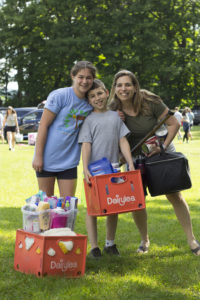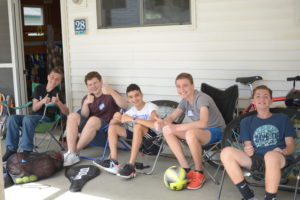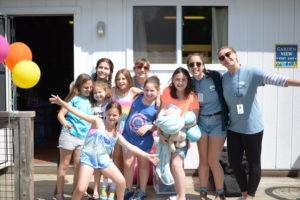By Gail Sinai, JD, LCSW, former camp parent and board member
The annual ritual of camp drop off can feel like an impending disaster, a manageable chore, or a delightful experience. What are the steps to making camp drop off a good event so that parents and kids are happy to see camp start and enjoy the summer? In addition to packing and planning, good parenting strategies can set everyone on the best path.
Let Your Child Have the Feelings
 Starting a summer at camp is a big transition and your child is likely to have some big feelings. Those feelings are not predictions or problems. It is just how your child reacts to change. And each child reacts to starting camp in a different way. Your child might be nervous or unsure or angry or disappointed or indifferent or any other feeling. That’s just the way it is for your child right now. Those feelings do not mean that camp won’t work out! Let your child have his or her experience with kindness and understanding but without getting too concerned yourself.
Starting a summer at camp is a big transition and your child is likely to have some big feelings. Those feelings are not predictions or problems. It is just how your child reacts to change. And each child reacts to starting camp in a different way. Your child might be nervous or unsure or angry or disappointed or indifferent or any other feeling. That’s just the way it is for your child right now. Those feelings do not mean that camp won’t work out! Let your child have his or her experience with kindness and understanding but without getting too concerned yourself.
Confirm the Concerns: Don’t Solve Them
Often, parents hear children’s concerns and want to fix them. Naturally we do; we want our children to be happy and we want to help, but that can backfire. Camp is about being independent and learning to solve problems along the way. For example, perhaps your child is worried about making friends. I worried too! Let your child know the worries make sense and that you hear and understand, without taking action. Often, a child’s worry, or other feelings, ebb just by knowing mom and dad get it. A good question, like “if that comes up, what steps will you take?” will start your child on the road to solving the concern.
Don’t Minimize the Feelings: Normalize Them
 Sometimes, when a child has big feelings like worry or fear, adults know those feelings are misplaced or exaggerated. Feelings are just a person’s first prediction, not necessarily how things will work out. Yet, we cannot expect our children to just hear us tell them their feelings are silly, and agree.
Sometimes, when a child has big feelings like worry or fear, adults know those feelings are misplaced or exaggerated. Feelings are just a person’s first prediction, not necessarily how things will work out. Yet, we cannot expect our children to just hear us tell them their feelings are silly, and agree.
The most effective way to give your child the idea that their feelings are not facts, is to support them now and let the summer prove that everything works out. At drop off, a child usually needs us only to get it and let them know they are reacting as many other children do. Feeling normal often is enough to slow a concern down.
For example, if your child feels concerned about a camp activity and will be forced to participate, help by assuring them that many children over the years have had the same concern. It might feel strange, but try to skip assuring them or telling them they are wrong, even though of course all will be well. A child who knows that his or her worries are ordinary often comes to realize independently that the worry was overstated, or solvable.
Address your child’s concerns—confidently!
Be kind about your children’s feelings, but not flustered. Don’t make those feelings your feelings. Keep in mind, your directors have been doing this FOREVER, and they have addressed more kid situations you can think of. This is the summer of your child’s life, but it is just another summer at CLC, and it will have bumps and joys and will all work out as it always does.
Of course, we parents are under stress too as we drop off our children. I sure was. We are happy and sad and overwhelmed and relieved and all the other parent feelings. That is completely ordinary. You can best help your child transition into camp if you try to keep your emotional thermostat in the mid-range, so there is room for your child. Of course, have those feelings: a bit worried, a smidge sad, pretty happy. Just leave room for your child’s feelings, which might be different. The parent coffee and the car home is time to let it all hang out. Staying in your own mid-range during drop off helps your child go through feelings and finish them, even if the resolution happens after you leave.
Say a Simple Goodbye
After unpacking and meeting counselors and a few campers, it is time to say goodbye for a few weeks. Communicate your confidence that all will be well by making simple goodbyes. After unpacking, meeting counselors and a few campers, give your child a warning—5 minutes until goodbye—then say a warm, yet brief and confident, goodbye. “Have fun!” “See ya in 4 weeks!” “Can’t wait for your first letter, and look for mine!” and other warm expressions let your child know you care and are still sure all will be well. Receive your child’s goodbye, even if it is worried, with calmness. Your child will be relieved that you are confident.
 Sometimes, a child does not resolve their start-of-camp feelings before the parent leaves. Perhaps that child needs to know the counselor just a bit better, or wants to let the jitters pass. Maybe your child just needs lunch! In any event, maintain your confidence and your departure. If anything does happen, camp will be in touch, and no news is good news. But at goodbye, assure your child that you know he or she is up to the task. And wait for the first picture.
Sometimes, a child does not resolve their start-of-camp feelings before the parent leaves. Perhaps that child needs to know the counselor just a bit better, or wants to let the jitters pass. Maybe your child just needs lunch! In any event, maintain your confidence and your departure. If anything does happen, camp will be in touch, and no news is good news. But at goodbye, assure your child that you know he or she is up to the task. And wait for the first picture.
It is All OK!
Camp has worked for many years for many, many children. Even though messes happen, it is all going to be ok. You will get some pictures and some letters that show a day in the life of camp: happy times, meal times, boo-boos, disputes, solutions, songs, swim, sports, sleep. Tomorrow is the next day with more of the same. At pick up, you will see that your child weathered it all with the support of counselors, staff and campers, and has grown up a bit. It is a miracle happening a little day by day. Enjoy your time apart, and be ready to welcome home a slightly older, more confident, more independent, and much more tired, child in what is truly the blink of an eye.
Gail Sinai, JD, LCSW, has a private psychotherapy practice in New York focusing on parent therapy, support and coaching. Visit her web site, gailsinai.com, or feel free to contact her at 917-583-9358 or therapy.gail.sinai.lcsw@gmail.com to learn more.

